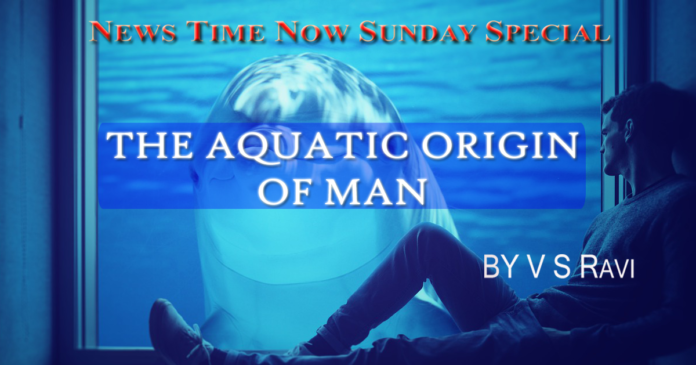”Two of far nobler shape erect and tall,
Godlike erect with native honour clad,
In naked majesty seemed Lords of all
And worthy seemed for in their looks divine
The image of their glorious maker shone”
So wrote Milton glorifying the erect shape of humans as compared to the lower animals.
Even though, most of the laws of evolution formulated by Charles Darwin have been accepted by the entire scientific community all over the world, there are a few mysteries which still remain unsolved. One scientist had humorously observed that all the physical evidence that we have in support of the theory of human evolution can be put inside a single rectangular box of the size of a coffin! He also opined that the fossils that throw light on our family tree are so few in number that there are more scientists than specimens!
Despite the monumental work done by paleontologists like Richard Leaky and Donald Johanson in East Africa, there are huge gaps in our knowledge of the history of evolution. Some of these voids stretch from 4 to 6 million years. To cite an example, an young student of biology would be perhaps justified in drawing the inference, however, erroneous it may be, that modem apes seem to have sprung out of nowhere, for there exists no fossil record to give us clues about their past. Similarly, we would have to confess that our view of the earliest specimen of man as an erect, tall, naked, tool-making, large brained being is .controversial
Evolutionary biologists, however, have not remained idle. They have been sparing no effort to arrive at the truth. One idea which has been around for more than four decades is a highly speculative theory suggested by a respected British Marine biologist who wrote a short paper on the subject in a prestigious scientific journal.
He wondered whether Man had been aquatic in the past. He himself suggested an answer to his question by venturing to speculate that we might be the descendants, not of an ancestor struggling to make good and stand on its own two feet in a dry and hostile environment, but of a successful aquatic (i.e. someone living in or near water).
In order to substantiate his revolutionary hypothesis, he put forth several arguments.
- Humans have naked skin, unlike other primates. This would naturally suit an aquatic animal in a warm climate.
- Secondly, the area of tiny residual hairs that still remain on the skin and which are clearly visible on a human foetus are arranged in such a way that they offer least resistance to water flowing past the body during swimming.
- Thirdly we seem to have retained our hair on the head in order to protect the open area exposed to the harsh tropical sun.
- Fourthly humans are also unlike other living primates in having a layer of fat beneath the skin similar to the blubber on a whale, for streamlining the body as well as keeping it warm, when underwater.
- And lastly he also speculated that new born human infants seem to have a natural ability to swim both on the surface and under water and that even without training they display proper breath control, closing their tiny mouths when submerged. However this “infant hypothesis” has been totally rejected by scientists. According to them it’s just that human babies only demonstrate an innate swimming and diving reflex which are part of a wider range of reflexes found in infants and babies, from birth until the age of approximately six months.
It is now accepted that babies younger than six months cannot actually swim, because of they lack body strength and certain other features. It is known that some other mammals also have this reflex, involving a slowed heart rate, a loss of capacity to breathe, and a reduction of blood circulation to crucial areas like fingers and toes. Another important feature is that during the diving reflex, the average of the infant’s heart rate decreases by 20%.The glottis is spontaneously sealed off. This prevents the water from entering the upper respiratory tract by diverting it down the esophagus into the stomach. Therefore the diving response had the effect of conserving oxygen- during movement as well as at rest. Thus the heart and the brain get Oxygen, delaying the onset of serious danger due to hypoxia. Therefore he concluded that the diving response can regarded as an important defence mechanism for the body. However as stated above, the theory that infants have a natural ability to swim has absolutely no basis!
Reverting to the aquatic origin theory the very same British biologist who propounded the theory, also suggested another possibility. He opined that the aquatic factor could have been inherited from a period when our ancestors had been forced by competition on the land to hunt for food in shallow waters off the coast. He further speculated that humans started by crouching but gradually became more adept at swimming. Because of the support provided by the water and the necessity to keep up the head for breathing, humans became, while gathering food, more and more erect, slowly but inevitably.
Other scientists have tried to elaborate on these speculations. Some have held that human-beings still retain residual webs between their fingers and toes; that human noses with the nostrils pointed down wards are far better designed to keep water out than those of other primates; that like many marine animals, human beings bring out salty tears when they weep; and the heartbeats and other bodily processes of humans slow down using less oxygen when they are swimming under water.
One must admit that there is a great deal about the Marine biologist’s thesis of the aquatic ancestor of man that is not only appealing but also compellingly persuasive but its relevance to biology will mainly depend on whether scientists can get hard evidence of a truly scientific nature in support of his ideas. Already many scientist are making initial studies of several likely sites for finding fossils and other evidence that might throw light on the Marine biologist’s theories. If his thesis turns out to be correct it would constitute yet another important milestone in evolutionary biology, even if it cannot be compared with Darwin’s theory of evolution which had revolutionised biology.


















































